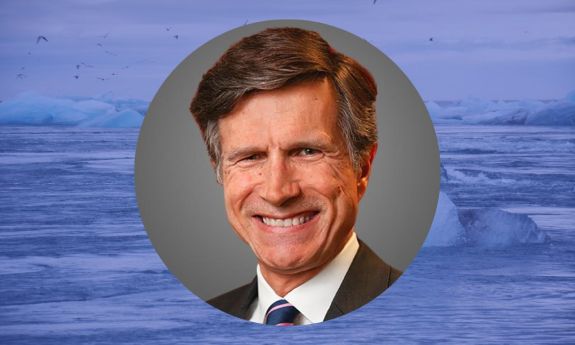Ambassador: Some Good News, But Greater Efforts Needed to Fight Climate Change

How goes the global effort to fight climate change?
It’s a mix, according to a former diplomat who worked for the United States’ special envoy for climate change.
More than 2,200 businesses worldwide are part of what's called the science-based targets initiative that sets greenhouse gas emission-reduction targets that are consistent with net zero by the year 2050.
And 150 countries -- roughly three-quarters of the world -- have signed a pledge to slash global methane emissions by 30 percent by 2030. In addition, the European Union has a plan to cut greenhouse gas emissions by at least 55 percent from 1990 levels by 2,030, which could enable the EU to reach net zero by 2050.
At the same time, the cost of new energy technologies including green hydrogen and battery storage are falling, which makes them more accessible.
Despite these somewhat positive figures shared Thursday by Robert O. Blake, former U.S. ambassador to Indonesia and former senior adviser to U.S. envoy for climate change John Kerry, accountability is lacking, he said.
Blake spoke during a webinar hosted by Duke’s Rethinking Diplomacy Program as part of a new series on Climate Diplomacy. The event aligns with the goals of the Duke Climate Commitment, which unites the university’s education, research, operations and public service missions to address the climate crisis.
“I think it's fair to say that the private sector all over the world now is coming to the greenhouse gas emission reduction table,” Blake said. “Some because they believe it makes good financial sense, others because they want to be good corporate citizens, or face shareholder pressure of one sort or another. Some because they face compliance and reporting requirements, particularly if they are exporting to the United States or the European Union.”
Blake also talked about the need to ensure climate discussions are part of diplomatic efforts, which reflects the primary purpose of the Rethinking Diplomacy Program – to connect diplomats, policy practitioners, faculty, students and climate experts in various disciplines for academic collaboration, policy recommendations and scholarship.
Blake said he sees a need for greater institutionalization of climate diplomacy at the State Department, which he said has made progress to develop its climate capabilities.
“There remains really quite a lot to do,” he said, calling for the creation of a climate bureau at the State Department and improving the career track for climate-related foreign service work.
Moderator Robert Pearson, a Rethinking Diplomacy Program fellow and former U.S. ambassador to Turkey, agreed with Blake’s assessment of the State Department.
“We've been working here at Duke on trying to get the State Department to do much more on the on the importance of science and diplomacy,” Pearson said.
“We absolutely need the anger and the excitement of the younger generation, because their voices, people like Greta Thunberg, are absolutely essential to continue to push.”
Robert O. Blake
He also suggested a focus on private enterprise that creates incentives and accountability for businesses that “might not only help people around the world to see what we're doing, but also to help more companies and more people get involved in helping us solve these problems.”
Blake said most businesses have not implemented climate-friendly policies and practices they promised to enact.
“I think the issue of accountability is super important,” he said, adding that only “a tiny fraction of the companies that have serious commitments have actually implemented them.”
“Again, we have to be a little bit careful as diplomats, because there is a lot of nationalism in these countries, and we've got to be careful not to be dictating how to these things should be implemented,” Blake said.
Panelist Gabriela Nagle Alverio, a law student and Ph.D. candidate in environmental policy, questioned the success of past and current diplomacy models.
“Give us some hope to the young people who feel this way. What are the aspects of diplomacy that we should hold on to and harness in order to move forward?” she asked Blake.
“We absolutely need the anger and the excitement of the younger generation, because their voices, people like Greta Thunberg, are absolutely essential to continue to push,” Blake said, countering that existing efforts have had success.
The webinar was co-sponsored by the Nicholas Institute for Energy, Environment & Sustainability, James E. Rogers Energy Access Project, and Sanford School of Public Policy.
Giovanni Zanalda, a professor of the practice in the Social Science Research Institute (SSRI), economics and history and director of the Rethinking Diplomacy Program, hosted the webinar. Other panelists were Jackson Ewing, senior fellow at the Nicholas Institute for Energy, Environment & Sustainability, Jonathan Phillips, director of the James E. Rogers Energy Access Project at Duke, and Erika Weinthal, professor of environmental policy and public policy at the Nicholas School of the Environment.